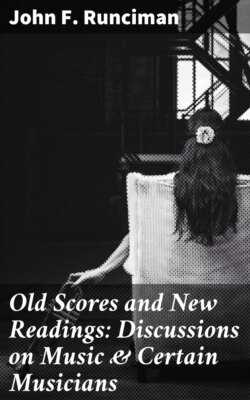Читать книгу Old Scores and New Readings: Discussions on Music & Certain Musicians - John F. Runciman - Страница 15
На сайте Литреса книга снята с продажи.
III.
ОглавлениеTable of Contents
The "Matthew" Passion arouses a very different mood from that aroused by the "John." One does not remember the turbulent people's choruses, nor the piercing note of anguish, nor any rapturous song or chorus; for all else is drowned in the recollection of an overwhelming utterance of love and human sorrow and infinite tenderness. Much else there is in the "Matthew" Passion, just as there is love and tenderness in the "John"; but just as these are subordinated in the "John" to the more striking features I have mentioned, so in the "Matthew" the noise of the people and the expression of keen remorse are subordinated to love and human tenderness and infinite sorrow. The small number and conciseness of the people's choruses have already been alluded to, and it may easily be shown that the penitential music is brief compared with the love music, besides having a great deal of the love, the yearning love, feeling in it. The list of penitential pieces is exhausted when I have mentioned "Come, ye daughters," "Guilt for sin," "Break and die," "O Grief," "Alas! now is my Saviour gone," and "Have mercy upon me"; and, on the other hand, we have "Thou blessed Saviour," the Last Supper music, the succeeding recitative and song, "O man, thy heavy sin lament," "To us He hath done all things," "For love my Saviour suffered," "Come, blessed Cross," and "See the Saviour's outstretched arm," every one of which, not to speak of some other songs and most of the chorales, is sheer love music of the purest sort. This, then, seems to me the difference between the "Matthew" Passion and its predecessor: in the "John" Bach tried to purge his audience in the regular evangelical manner by pity and terror and hope. But during the next six years his spiritual development was so amazing, that while remaining intellectually faithful to evangelical dogma and perhaps such bogies as the devil and hell, he yet saw that the best way of purifying his audience was to set Jesus of Nazareth before them as the highest type of manhood he knew, as the man who so loved men that He died for them. There is therefore in the "Matthew" Passion neither the blank despair nor the feverish ecstasy of the "John," for they have no part to play there. Human sorrow and human love are the themes. Whenever I hear a fine rendering of the "Matthew" Passion, it seems to me that no composer, not even Mozart, could be more tender than Bach. It is often hard to get into communication with him, for he often appeals to feelings that no longer stir humanity—such, for instance, as the obsolete "sense of sin,"—but once it is done, he works miracles. Take, for example, the scene in which Jesus tells His disciples that one of them will betray Him. They ask, in chorus, "Herr, bin ich's?" There is a pause, and the chorale, "Ich bin's, ich sollte büssen," is thundered out by congregation and organ; then the agony passes away at the thought of the Redeemer, and the last line, "Das hat verdienet meine Seel," is almost intolerable in its sweetness. The songs, of course, appeal naturally to-day to all who will listen to them; but it is in such passages as this that Bach spoke most powerfully to his generation, and speaks now to those who will learn to understand him. Those who understand him can easily perceive the "John" Passion to be a powerful artistic embodiment of an eighteenth century idea; and they may also perceive that the "Matthew" is greater, because it is, on the whole, a little more beautiful, and because its main idea—which so far transcended the eighteenth century understanding that the eighteenth century preferred the "John"—is one of the loftiest that has yet visited the human mind.
